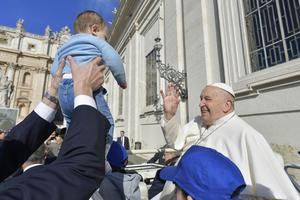President Biden Says He ‘Admired’ Benedict XVI, Recalls Conversation About Aquinas
President Joe Biden on Wednesday professed his admiration for the late pope, who died on Dec. 31, recalling their meeting in which they discussed the medieval theologian and his influential capstone work.

President Joe Biden on Wednesday professed his admiration for the late Pope Benedict XVI, who died on Dec. 31, recalling their meeting in which they discussed Catholic theology.
“What did Pope Benedict mean to you as a Catholic?” EWTN White House correspondent Owen Jensen asked Biden on Jan. 4.
“I had an opportunity to spend some time with Pope Benedict, a couple of hours, and he was a great … and reminded me of going back to theology class,” the president responded. “We spoke about Aquinas and about [the] Summa Theologica,” he said, referring to the medieval theologian St. Thomas Aquinas and his influential capstone work.
The president reflected on Pope Benedict: “I found him to be relaxing, very rational, and he had a more conservative view within the Catholic realm than I have. I’m closer to the present Pope, in terms of his philosophy, his view.”
“But I admired him. I thought he was a fine man,” Biden said.
As U.S. vice president, Biden met with Pope Benedict XVI in an unannounced visit to the Vatican on June 3, 2011. At the time of the visit, neither Biden nor the Vatican Press Office spoke about what was discussed at the meeting.
Biden did not specify in what matter he is closer to the views of Pope Francis than to those of Pope Benedict XVI.
The Catholic president has become a staunch backer of legal abortion, a position that Pope Francis has described as an “incoherence.” Last year in an interview with Univisión and Televisa broadcast July 12, Pope Francis said the president should talk to his pastor about this.
“Is it just to eliminate a human life?” the Pope asked.
Catholic opposition to abortion dates back to the earliest days of Christianity.
Catholic critics of the president, including some bishops, have pressed the question of whether he should be admitted to Holy Communion, given his support for legal abortion.
While Biden has claimed Pope Francis told him to continue to receive Communion, the Vatican has declined to clarify this point.
Biden’s differences with the “conservative” Pope Benedict also included the Iraq War, which the U.S. launched in 2003 after a long debate. In 2002, Biden was among 77 U.S. senators to vote to authorize the use of military force against Iraq, a position the future president backed away from as early as 2005.
Pope John Paul II vocally opposed the American war on Iraq, and then Cardinal Joseph Ratzinger, speaking in a personal capacity, echoed many of these criticisms. He rejected the idea that just-war theory justified “preventive war” and spoke of the need to rely on the final decision of the United Nations.
Though the Iraq War removed the harsh government of Saddam Hussein, the conflict and its aftermath killed hundreds of thousands of combatants and civilians and destabilized the region.
In a Dec. 31 statement, Biden praised Benedict XVI as “a renowned theologian” and “an inspiration to us all.”
In his Wednesday exchange with President Biden, EWTN’s Jensen asked the president why he wasn’t attending Benedict XVI’s funeral.
“The reason I’m not attending the funeral tomorrow is because it takes an entourage of 1,000 people to show up,” the president responded. “Not literally, but we would move everything in the wrong direction. And I inquired about that.”
“People are sending most of their apostolic delegates, their folks in Rome,” Biden said in an apparent reference to countries’ embassies to the Vatican.
“We would just get in the way, but I’ve made my views known,” Biden said. “At any rate, I think he was a fine man.”
In response to a question from EWTN News on Jan. 3, White House spokeswoman Karine Jean-Pierre said that “the U.S. ambassador to the Holy See, Joe Donnelly, will represent the United States at the funeral of the pope, in line with the wishes of the late pope and the Vatican. This is what their requests were.”
The Vatican’s Press Office has confirmed that only two official state delegations, those of Italy and Germany, were invited to the funeral of the late pope emeritus, which will be held on Jan. 5.
Vatican spokesman Matteo Bruni told reporters that, “following the wishes of the pope emeritus, the funeral will be held under the sign of simplicity,” stressing that it will be a “solemn but sober funeral.”
While only two state delegations were officially invited to attend the funeral Mass for the deceased former pontiff, some heads of state and public figures have decided to attend the funeral in an unofficial capacity.
Polish President Andrzej Duda, Hungarian Prime Minister Viktor Orban, Czech Prime Minister Petr Fiala, and Slovenian President Nataša Pirc Musar are among those who have already confirmed their attendance at Benedict XVI’s funeral in an unofficial capacity.
European royals Queen Sofia of Spain and King Philip and Queen Mathilde of Belgium also plan to attend.
- Keywords:
- owen jensen
- benedict xvi
- ewtn
















